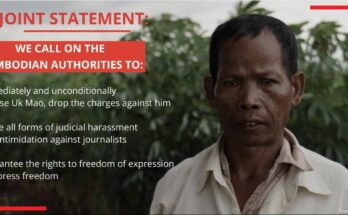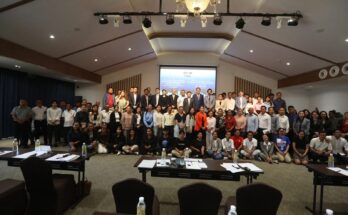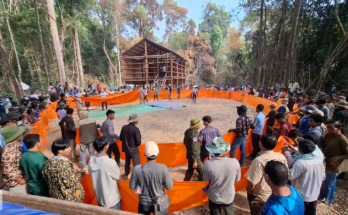Phnom Penh, 01 May 2025
We, the undersigned independent trade union confederations and federations, labor and women’s rights organizations, youth networks, informal economy practitioners, local communities, and workers from various sectors have come together to celebrate the 139th International Workers’ Day, united under the banner: Together, Continue to Implement Fundamental Freedoms to Ensure Social Justice.
The labor force remains Cambodia’s largest economic asset, comprising approximately 9.23 million workers. This includes about 925,000 workers in the garment, footwear, and travel goods sectors; 630,000 in the hotel, tourism, and services sectors; and nearly 300,000 in construction. Additionally, around 63% of the population relies on agriculture for their livelihoods and to meet national food security needs. In addition, in 2024, approximately 1.38 million Cambodian migrant workers sent home around $2.95 billion – hard-earned wages that made up roughly 11% of the country’s annual GDP. According to estimates by Center for Alliance of Labour and Human Rights (CENTRAL), each migrant worker, on average, supports two to three family members with their income. With every garment sewn, every brick laid, every service delivered – workers build our industries, feed our families, and sustain our communities.
Cambodia’s rising revenue is built on the backs of workers in these industries, yet they earn poverty-level wages. Moreover, several sectors, including construction, tourism, services, and the informal economy, are still excluded from minimum wage protections, leaving them vulnerable to exploitation. The garment, footwear, and travel products sector, the only sector with a set minimum wage, it remains inadequate and has not kept pace with the rising cost of living. In 2025, the minimum wage for garment workers increased to only $208, still far below the living wage of approximately $644.12 USD or 2,641,890.86 riels ) as reported by Asia Floor Wage Alliance.
Workers, particularly women, continue to face serious workplace challenges, including short-term contracts, production-based employment pressure, poor working conditions, health risks due to factory emissions and extreme heat, gender-based violence and harassment, discrimination from employers, lack of workplace childcare facilities, and threats of unfair dismissal. when workers speaking out often results in retaliation like verbal threats or illegal termination.
In addition, workers and union leaders continue to face significant obstacles in exercising their fundamental freedoms, including freedom of expression, freedom of association, and the right to peaceful assembly, despite these rights being protected under the Cambodian Constitution and the International Covenant on Civil and Political Rights. Workers and union leaders face arrest being charged with serious criminal offenses, or placed under judicial supervision simply for exercising these freedoms and engaging in labor rights activism.
During the third and fourth cycles of Cambodia’s Universal Periodic Review (UPR) process, as well as at the 2024 International Labour Organization (ILO) Summit in Geneva, UN member states and delegates from over 100 countries recommended that Cambodia improve working conditions, facilitate trade union registration, guarantee fundamental freedoms—particularly the right to peaceful assembly and the right to strike—and drop criminal charges against union leaders and workers while enhancing their protection. However, the government has failed to implement these recommendations. Workers across various sectors, including the informal economy, have yet to see their rights fully respected, protected, and promoted in accordance with the government’s stated commitments.
While trade agreements have far-reaching impacts on the national economy and workers’ livelihoods, economic growth cannot be separated from the protection of fundamental labor and human rights. As Cambodia seeks to strengthen trade relations—such as through a potential agreement with the United States that would allow duty-free or reduced-tariff access for Cambodian goods—respect for labor rights and an end to the persecution of union leaders, worker representatives, and labor activists must be central to the Royal Government’s trade and dispute resolution strategies. In parallel, the Government should pursue discussions with the European Commission on the possible reinstatement of the 20 percent tariff preference under the Everything But Arms (EBA) scheme. The importance of rights-based trade policy was underscored in the European Parliament’s resolution on November 28, 2024, which highlighted the case of CENTRAL and called for a review of Cambodia’s trade preferences if civil liberties and democratic space continue to deteriorate.
In pursuit of national economic prosperity and the well-being of Cambodian workers and citizens, we, the undersigned, respectfully call on the Royal Government of Cambodia to consider and meaningfully address the following 13 priority demands:
Demand 1: Restore fundamental civil liberties, especially freedom of expression, freedom of assembly, freedom to form unions, and stop the abuse and harassment of labor activists, union members and leaders, as well as implement other recommendations of the European Parliament, the UN Human Rights related mechanisms, and the International Labor Organization, in order to be able to obtain the 20 percent tariff elimination under the EBA preferential tariff system.
Demand 2: Discuss with employers’ associations and representatives of major purchasing companies to find ways to sustain job and investment in Cambodia, in consultation with unions and stakeholders.
Demand 3: Facilitate negotiations between workers, unions, and employers or brands to resolve cases of wage theft and denial of legal benefits during the COVID-19 pandemic, ensuring that workers receive lost wages and benefits, especially in cases where factories stop operating.
Demand 4: Simplify the procedure for registering unions, without discrimination and creating obstacles, based on recommendations provided by the International Labor Organization and various mechanisms.
Demand 5: Amend the Trade Union Law in consultation with trade unions and other relevant stakeholders and ensure that workers have full freedom to form and join trade unions in accordance with international labour standards, including ILO Conventions 87 and 98, the Constitution of Cambodia (Articles 36 and 42) and the Cambodian Labour Law (Articles 266 and 267).
Demand 6: Drop criminal charges and lawsuits against trade union leaders and environmental activists, etc., who exercise their legitimate rights and freedoms under the Constitution and the core ILO labour conventions, in full compliance with the recommendations received from the 3rd and 4th UPRs of Cambodia, including the 2024 ILO Labour Summit.
Demand 7: Increase national budget allocations for social protection systems and expand = coverage to workers in the construction, services, hotels, food, agriculture, and informal economy sectors, including youth and students, by promoting efficiency and quality in providing reliable, non-discriminatory, and transparent services, especially health care services, by assessing service users and beneficiaries of the National Social Security Fund.
Demand 8: Recognize the important role of the Arbitration Council and mobilize funds from development partners and stakeholders to support the operation of the Arbitration Council to ensure effective, independent, and sustainable resolution of labor disputes that are acceptable to the parties involved.
Demand 9: Develop policies or laws to promote the health and safety of workers in various sectors, such as agriculture, entertainment, and construction, in accordance with the ILO Code of Practice on Safety and Health in Construction.
Demand 10: Reform the wage structure and expand the minimum wage in other sectors, such as tourism, hotels, and construction, including promoting a study of economic and social needs to determine a national living wage.
Demand 11: Amend the electoral law to include migrant workers in the right to vote remotely and expand the scope of the social protection system for Cambodian migrant workers.
Demand 12: Develop specific policies to ensure markets and fair prices for domestic agricultural products in accordance with the Constitution and the International Universal Declaration of the Rights of Farmers, including expanding the social protection system for workers in agriculture.
Demand 13: Encourage unions, employers and brands to sign agreements that incorporate international labor standards and good practices, such as Convention 190 and Recommendation 206 of the International Labor Organization and the Organization for Economic Co-operation and Development (OECD) Guidelines on Responsible Business Conduct for Multinational Enterprises, to prevent and eliminate gender-based violence and harassment, as well as all forms of discrimination in the workplace.
For more information, please contact:
Mr. Khun Tharo, Program Manager of Center for Alliance of Labor and Human Rights ( CENTRAL)
Phone: 093 556 671
Mrs. Ou Tephallin, President of Cambodian Federation of Food and Service Workers’ Unions
phone: 011 984 883
Civil Society Organizations and local communities endorsing this joint statement:
- Cambodian Federation of Food and Service Workers’ Unions (CFSWF)
- Cambodian Alliance of Trade Unions (CATU)
- Center for Alliance of Labor and Human Rights ( CENTRAL)
- Cambodian Youth Network (CYN)
- Samakum Teang Tnaot (STT)
- Equitable Cambodia (EC)
- Independent Democratic Association of the Informal Economy (IDEA)
- Cambodian League for the Promotion and Defense of Human Rights (LICADHO)
- Youth Resource Development Program (YRDP)
- Cambodia Tourism Workers’ Union Federation (CTWUF)
- Cambodian Human Rights and Development Association (ADHOC)
- Klahaan
- Cambodian Center for Human Rights (CCHR)
- Cambodian Workers’ Rights Support Union of Nagaworld (LRSU)
- Committee for Free and Fair Elections in Cambodia (COMFREL)
- Rural Women’s Association for the Environment (RWAA)
- Cambodian Institute for Democracy (CID)
- Asia Floor Wage Alliance (AFWA)
- Federation of Free Trade Union of Workers of the Kingdom of Cambodia (FTUWKC)
- Federation of Labor Unions (FULI)
- Federation Union of Free and Independent (FUFI)
- Federation of Independent Trade Unions (INTUFE)
- Cambodian Independent Trade Unions Federation (CITUFED)
- Building and Wood Workers Trade Union Federation of Cambodia (BWTUC)
- Partnership for Environment and Development Organization (PED)
- Coalition for Partnership in Democratic Development (CPDD)
- Brave Women’s Community
- 92 Land Community
- Pong Ror Saenchey Community
- Smar San Community
- Steung Kambot Community
- Chmar Eart Community
- Railway Community
- Thmar Sar Samki Community
- Lor Peang Land Community
- Veal Entrey Community
- Thlan 100 Community
- Chi Khor Lue 197 Land Community (Koh Kong)
- Prey Lang Community Network (PLCN)
- Am Leang Community (Kampong Speu)
- Andong Trabek Land Community (Svay Rieng)
- Bos Snor Community (Tbong Khmum)
- Chi Kha Kraom Land Community (Koh Kong)
- Community to Protect Nature (Pursat)
- Dak Por Community (Kampong Speu)
- Klaing Toek 78 Community (Siemreap)
- Kouy Indigenous Community (Preah Vihear)
- Kouy Indigenous Community in Ngan commune (Kampong Thom)
- Kouy Indigenous Community in Prame Commune (Preah Vihear)
- Land Community (Pailin)
- Lor Peang Community (Kampong Chhnang)
- Nature Protection Odom Sre Pors Community (Kampong Speu)
- Phnom Krom Community (Siemreap)
- Phum Sela Khmer Land Community (Banteay Meanchey)
- Rattanak Rokha Forestry Community (Oddar Meanchey)
- Reaksmei Sameakki Community (Kampong Speu)
- Samaki Sangkae Pir Mean Rith (Preah Vihear)
- Srae Prang Land Community (Tboung Khmum)
- Sre Ampel Water Fall Tourism Forestry Community (Kampong Chhnang)
- Ta Ni Land Community (Siemreap)
- Thnaot Chum Land Community (Pursat)
- Trapeang Chour Community (Kampong Speu)
Download Joint Statement-May Day (ENG)-Final



